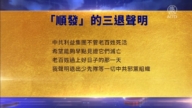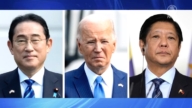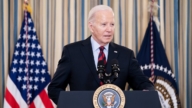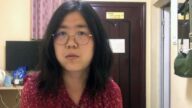【新唐人2012年5月16日讯】广东省委书记汪洋,作为团派大将,一直被视为胡锦涛政治动向的风向标,最近他的政改雷声骤然变大,引起了媒体的关注,是胡温为了推行政改在试探水温?还是共产党感觉到民众解体它的压力,而采取的权宜之策?外界普遍认为,共产党历来好话说尽,坏事干绝,政改不能只听其言,还需要看行动,中国的民主也要靠中国人民自己争取。
14号,中共广东省委书记汪洋在连任后发表谈话时,强调“以权谋私,千夫所指,人所不齿”。他说,我们手中的权力是人民赋予的,只能用来为人民谋利,我们必须始终坚持“立党为公、执政为民”,始终坚持秉公用权,廉政从政,请大家监督。
《中国事务》杂志主编伍凡认为,中共高层想利用广东的这些优势,让汪洋放出话来试探民众反映,并不是要在广东搞政治改革试点,民众对他的话用不着太在意。
伍凡:“讲话的目地是什么,在我看来试水,看看大家反映如何,还有一个试试水温,我讲的话是,这个水温适不适应,仅仅是做一个舆论工作,而不是实际工作。”
时政评论员蓝述认为,一个人说了什么并不重要,行为才能说明问题。蓝述说中共至今还没有对任何阻碍改革的“血债派”人物采取实际行动,对“政改”的传言不能过于乐观。
蓝述:“真正想做什么,那就做出来,你可以直接提民主嘛,如果你要是真的自觉自愿接受民众的监督的话,那你就给民众选票,把选举的权利交给民众,做了没有,这一条是最关键的,停留在嘴面上的说法,我们不能评判中共现在是否正在启动一场改革。”
汪洋的“以权谋私,千夫所指,立党为公、执政为民”被媒体当成“共产党的稀有物”,到处转载。汪洋前几天在党代会上也放出“必须破除人民幸福是党和政府恩赐的错误认识”的论调。
中国大陆媒体人黄良天说,中共的党不同于西方的党,共产党从诞生就是为他们自己集团的利益在战斗,如果真想“执政为民”,必须先摆脱共产党。
黄良天:“共产党在一开始的时候,坦白的告诉党外人士,我们要实现我们自己革命的目标,那个革命目标就是他们的私,所以共产党执政几十年以来,他的党的纪律,党的方针,党的政策一切都是根据黑社会的那种规章来制定,来执行的。”
近年来,气势澎湃的“退党大潮”和风起云涌的“民众抗暴事件”,天天都在发生。
时政评论员蓝述认为,现在中共明显的感受到了民众要解体它的压力,中国人不能把中国的改变寄托在中共的官员身上,因为,往往清廉的官员首先出局,所以应该继续给中共施加压力。
蓝述:“中共的改变完完全全是被动的,将来的解体也绝对是被动的,不可能是主动的,在这种情况下,中国的未来在中国人民自己的手里,不在中共高层的手里,即使在西方的民主制度下,西方人也从来没把监督政府的权力放在领导人的几句空话之上。”
薄熙来被解职后,外界普遍认为这是“重庆模式”的失败,但汪洋主政下的“广东模式”是否能在全大陆普遍采行? 评论说,中国如果仍然走“中国特色的社会主义道路”,中国的民主永远无法触及,中国人民永远呼吸不到自由的空气。
采访编辑/刘惠 后制/孙宁
Wang Yang’s Political Reform Talk: Testing the Water Temperature?
Guangdong’s Party chief, Wang Yang, is regarded as being
a weather vane showing Hu Jintao’s political developments.
Wang is the core member of the Youth League faction
within the Chinese Communist Party(CCP).
Recently, Wang’s political reform talks have suddenly
thundered, attracting media attention.
Are Hu & Wen testing the water temperature
before advancing in political reform?
Or is it the CCP’s measure against the pressure of the pubic
disintegrating them?
The CCP has always been promising the finest things
while doing all the most vile deeds in history, say outsiders.
Actions speak louder than words, when it comes to the CCP
regime’s political reform.
Commentators say it’s up to the Chinese people themselves
to strive for the realization of China’s democracy.
On May 14, Wang Yang, the CCP Secretary of Guangdong,
gave a speech after his re-election.
Wang stressed that, “the abuse of power for personal gain
is despised behavior."
“The power we hold in our hands is given by the people;
It can only be used to serve the people’s interests,
and we must always uphold that the Party exists to serve
public interests and that it governs for the people.”
“We must adhere to using our authority impartially and keep
a clean Governance. The public may supervise.” says Wang.
China Affairs magazine chief editor, WuFan, says, the public
does not need to be too concerned with Wang’s remarks.
Wu says he does not think the CCP’s top-level has
real intention to pilot political reform in Guangdong.
Wu Fan: “In my opinion, Wang’s talk aims to test the water
to see how the public reacts to it.
Another purpose is to determine whether political reform
suitable to be just as a propaganda or to put into practice.”
Commentator Lan Shu says, so far the CCP has not taken
actions against the “blood-debt clan” who have impeded the
reform—actions speak louder than words—the public should
not be too hopeful with the officially touted “political reform."
Lan Shu: “Just put into practice what you really want to do—
You could directly bring up the democracy issue.
If you are really willing to accept public supervision,
then just let the people vote.
Has the CCP really given voting rights back to the people?
—this issue is the most critical.
The official mantra can’t help judge whether the CCP is
prepared to start a reform.”
Wang Yang’s touting, considered rare and precious
by the media, was widely reproduced.
At the CCP’s Guangdong provincial congress, days ago,
Wang Yang said,
“Get rid of misconceptions that the CCP and
the government bestowed the people’s happiness.”
Media professional in China, Huang Liangtian, points out
that the CCP is different from those parties in the West.
The CCP has from its inception been committed only to
fighting for its own group’s interests.
People should leave the CCP, before it tries to achieve
the goal of “governing for the people".
Huang Liangtian: “At the outset, the CCP told outsiders
frankly: ‘We’ll achieve the goal of our own revolution’.
The CCP’s revolutionary goal is just for their private gains,
so over the decades, the CCP has formulated and applied
gangster-like discipline, guidelines and policies.”
In recent years, each day witnesses powerful campaigns of
“Quit the CCP” and vigorous surging “mass protests”.
Lan Shu thinks the CCP has obviously realized
its prospective disintegration by the public.
The Chinese should not lay their hopes on the CCP officials
to change China, because incorruptible officials are often
removed first from the CCP, so the existing CCP system
should be further pressured, Lan Shu remarks.
Lan Shu: “The CCP’s change is totally passive,
so it will disintegrate in the near future.
That is, China’s future is at the hands of the Chinese people;
It’s not controlled by the CCP top leadership.
Even in Western democracy, the public never supervised
the government by trusting the leaders’ few empty words."
Bo Xilai’s ouster was deemed a “Chongqing Mode” failure—
Will Wang Yang’s “Guangdong Mode” prevail across China?
Critics say, while China goes along “the road of socialism
with Chinese characteristics”, the country will never taste real democracy and freedom.


























